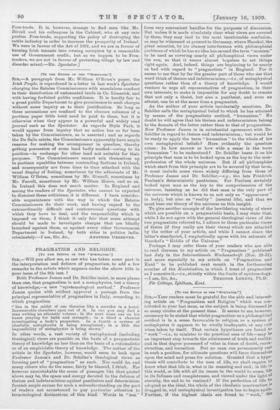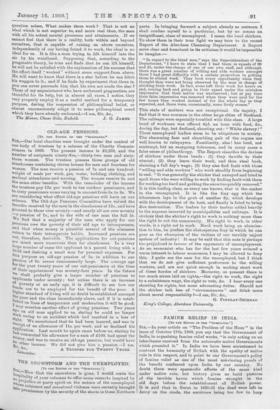[TO TIER EDITOR Or Tea "SPROTATOR: . ] SIR,--Your readers must be
grateful for the able and interest- ing article on "Pragmatism and Religion" which was con- tributed to your last issue, as the subject is being discussed iv. so many circles at the present time. It seems to me, however, necessary to be stated that whilst pragmatism as a philosophical method is in a sense favourable to religion, as a system of metaphysics it appears to be wholly inadequate, at any rate when taken by itself. That certain hypotheses are found to "work "—i.e., to minister to the practical uses of life—may be an important step towards the attainment of truth and reality, and in that degree possessed of value in times of doubt, recon- struction, and transition. But no man can permanently rest in such a position, for ultimate questions will force themselyee upon the mind and press for solution. Granted that a byee- thesis will contribute to the uses of life, we shall require te know what that life is, what is its meaning and end ; is life 10 this world, or life with all its issues in the world to come, life in its fullness and completeness, and viewed under the light of eternity, the end to be realised ? If the perfection of life be adopted as the ideal, the whole of the idealistic construction.le dragged in, and metaphysical investigation has to begin agalu• Further, if the highest ideals are found to "work," time question arises, What makes them work P That is not an Ideal which is not superior to, and more real than, the man with all his actual mental processes and attainments. If we cannot feel that there is a reality, both within and beyond ourselves, that is capable of raising us above ourselves, independently of our having found it to work, the ideal is no ideal for us. It is like a man trying to lift himself into the air by his waistband. Supposing that, according to the Pragmatic theory, he tries and finds that he can lift himself, he will not be satisfied with the explanation of his success that the effort itself worked" without some support from above. He will want to know that there is a star before be can hitch his waggon to it ; and if he finds by experiment that there is, You can never persuade him that his own act made the star ? Those of my acquaintance who have embraced pragmatism are thankful for its help, but in almost all cases, I notice, they very properly employ it as a useful method for a temporary Purpose, during the suspension of philosophical belief, or almost unconsciously adapt it to some philosophical creed Which they have already embraced.-1 am, Sir, 8to., The Manse, Chase Side, Enfield. J. G. JAMES.





































 Previous page
Previous page